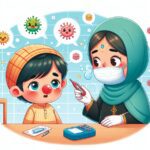The importance of handwashing in preventing infant illnesses cannot be overstated. As new parents, guardians, or caregivers, the health and well-being of our little ones are always a top priority. This article delves into why handwashing is a crucial practice in safeguarding infants from various diseases and provides actionable advice to incorporate effective hand hygiene into your daily routine.
The science behind handwashing and infant health
Handwashing works as a simple yet powerful tool to prevent the transmission of infectious diseases. According to the Centers for Disease Control and Prevention (CDC), proper hand hygiene can significantly reduce the risk of respiratory infections, diarrheal diseases, and even skin and eye infections. The act of washing hands with soap and water removes germs that can be picked up from various surfaces or activities and then transferred to an infant’s mouth, eyes, or nose, where they can cause illness.
For infants, whose immune systems are still developing, exposure to harmful pathogens can lead to serious health complications. Regular and thorough handwashing by caregivers and family members plays a pivotal role in creating a safe environment for these vulnerable members of our families.
The importance of handwashing in preventing infant illnesses
The importance of handwashing in preventing infant illnesses is supported by numerous health organizations worldwide. Infants are exposed to a variety of potential infection sources, including toys, household surfaces, and even direct contact with people who might be carriers of germs. Ensuring that everyone who interacts with an infant practices good hand hygiene can markedly decrease the likelihood of the child contracting contagious diseases.
Moreover, specific moments require particular attention to handwashing, such as before feeding an infant, after changing diapers, and upon returning home from public places. By adhering to these practices, caregivers can reduce the infant’s exposure to harmful pathogens and promote a healthier development during these critical early stages of life.
Practical tips for promoting hand hygiene in the household
To effectively implement handwashing practices, it’s essential to make hand hygiene a routine part of your family’s daily activities. Placing hand sanitizers in strategic locations around the home, such as near the entrance, in the baby’s room, and in common areas, can encourage frequent use by family members and visitors. Additionally, educating everyone in the household, including older siblings, about the importance of handwashing in preventing infant illnesses is key to creating a supportive environment for the infant’s health.
For times when soap and water are not immediately available, using an alcohol-based hand sanitizer that contains at least 60% alcohol can be an effective alternative. However, when hands are visibly dirty or greasy, soap and water should be your go-to choice for cleaning.
Ensuring that your baby grows up in a healthy environment involves more than just handwashing. Consider visiting our comprehensive guides on choosing the safest baby car seats for newborns, safe sleep practices to reduce the risk of SIDS, and handling nail cutting for infants to avoid injury for more tips on keeping your little one safe and healthy.
By emphasizing the importance of handwashing in preventing infant illnesses and adopting comprehensive safety measures, we can significantly impact our babies’ health and well-being. Let’s make hand hygiene a priority, not just for ourselves but for the sake of our most vulnerable.













